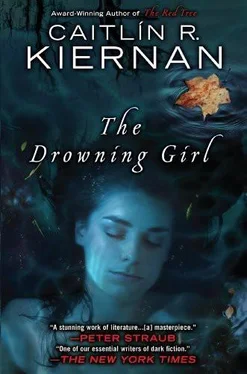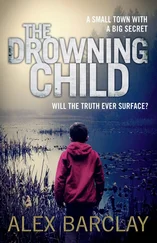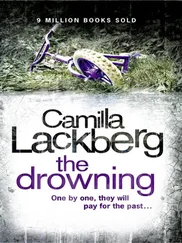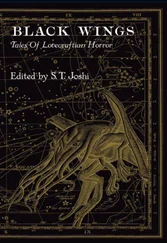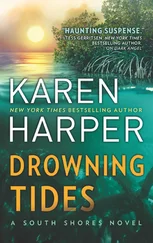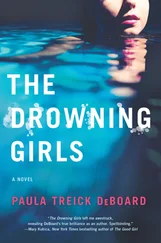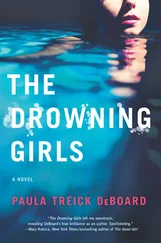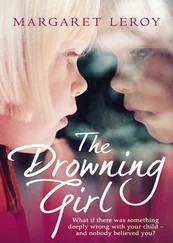Caitlín Kiernan - The Drowning Girl
Здесь есть возможность читать онлайн «Caitlín Kiernan - The Drowning Girl» весь текст электронной книги совершенно бесплатно (целиком полную версию без сокращений). В некоторых случаях можно слушать аудио, скачать через торрент в формате fb2 и присутствует краткое содержание. Год выпуска: 2012, ISBN: 2012, Издательство: Roc / New American Library, Жанр: Фэнтези, на английском языке. Описание произведения, (предисловие) а так же отзывы посетителей доступны на портале библиотеки ЛибКат.
- Название:The Drowning Girl
- Автор:
- Издательство:Roc / New American Library
- Жанр:
- Год:2012
- ISBN:978-0-451-46416-3
- Рейтинг книги:5 / 5. Голосов: 1
-
Избранное:Добавить в избранное
- Отзывы:
-
Ваша оценка:
- 100
- 1
- 2
- 3
- 4
- 5
The Drowning Girl: краткое содержание, описание и аннотация
Предлагаем к чтению аннотацию, описание, краткое содержание или предисловие (зависит от того, что написал сам автор книги «The Drowning Girl»). Если вы не нашли необходимую информацию о книге — напишите в комментариях, мы постараемся отыскать её.
The Drowning Girl — читать онлайн бесплатно полную книгу (весь текст) целиком
Ниже представлен текст книги, разбитый по страницам. Система сохранения места последней прочитанной страницы, позволяет с удобством читать онлайн бесплатно книгу «The Drowning Girl», без необходимости каждый раз заново искать на чём Вы остановились. Поставьте закладку, и сможете в любой момент перейти на страницу, на которой закончили чтение.
Интервал:
Закладка:
“I still say you shouldn’t let me keep you from going. It’s supposed to rain the rest of the week.”
“You’re sure? It’s all right if I go without you, I mean.”
“Positive. I’ll probably still be up when you get back, this one’s turning out to be such a bitch.”
I tell her that I won’t be gone more than a couple of hours at the most, and she says, “Well, then I’ll definitely still be up when you get back.”
Regardless, I almost don’t go. There’s a wash of apprehension, or dread. Some brand of misgiving. It isn’t so very different from what I felt back when the arithmomania was so bad, or the night I saw the raven-nuns in the park, or on innumerable other occasions when the crazy kicks into overdrive. Dr. Ogilvy has said repeatedly that whenever this happens, I should make a concerted effort to go ahead and do the thing that I’d meant to do, but was suddenly afraid of doing. Within reason, she’s said, I shouldn’t let the delusions and magical thinking and neuroses prevent me from living a normal life. Which means not locking up.
Normal is a bitter pill that we rail against.
Imp isn’t sure what that means. It just occurred to her, and she didn’t want to lose it.
I dislike this language, the detached argot of psychiatry and psychology. Words like codependent and normal , phrases like magical thinking . They disturb me far more than crazy and insane . Let it be enough to say, There’s a wash of apprehension, or dread.
Even so, I almost decide not to go alone. I almost reach for the book I’ve been reading, or go to my studio to work on the painting I’ve been trying to finish.
“I think it would be good for you,” Abalyn says, not looking away from the screen, her fingers still tapping away at the keyboard. “I don’t want to become a ball and chain.”
And this calls to mind another warning from Dr. Ogilvy, that if I ever should find myself in a relationship, not to allow my illness to let it drift into codependence. Not to risk losing my self-sufficiency.
“If you’re sure.”
“I’m totally sure, Imp. Go. Get out. It’s an order,” and she laughs. “If it’s not too late when you get home, we’ll watch a movie.”
“I have work tomorrow,” I say. “I can’t stay up that late.”
“Go,” she tells me again, and she stops typing long enough to make a shooing motion with her left hand. “I’ll still be here when you get home.”
So I got my keys, and a summer sweater just in case the night was chillier than it had seemed coming home from work. I kiss her, and say I won’t be gone long.
“Be careful,” she says. “Don’t drive so fast. One of these nights, you’re gonna get a ticket. Or hit a deer.” I reply that I’m always careful. I sound more defensive than I meant to, but Abalyn doesn’t appear to have noticed.
“You have your phone?” she asks.
It’s almost eleven thirty when I leave the house, but I don’t have to be at work until eleven the next morning. I pull back out onto Willow, turn onto Parade Street, then right on Westminster. I hardly think about where I might be headed. I hardly ever do on these drives. Any forethought or planning seems to defeat the purpose. Their therapeutic value seems to lie in their spontaneity, in the particular routes and destinations always being accidental. From Westminster, I cross the interstate and drive through downtown, with all its bright lights and unlit alleyways. I turn left, north, onto North Main Street, and pass Old North Burial Ground.
I don’t play the radio. I never play the radio on my night drives.
So, past North Burial Ground, and I continue on through Pawtucket, North Main becoming Highway 122. There’s more traffic than I would like, but then there’s almost always more traffic than I’d like. It’s long after midnight by the time I get to Woonsocket, with its decaying, deserted mills and the roaring cacophony of Thunder Mist Falls, there where the Blackstone River slips over the weirs of the Woonsocket Falls Dam. I pull into the parking lot on the eastern side of the dam. When I get out of the car, I look up and see that there’s a ring around the moon, reminding me of Abalyn’s warning that rain was on the way. But rain tomorrow, not tonight. Tonight the sky is clear and specked with stars. I lock the Honda’s doors and cross the otherwise empty parking lot and stand at the railing; I try hard to concentrate on nothing but the violent noise of the water crashing down onto the ragged granite island below the dam.
“Wouldn’t it be interesting,” Imp typed, “if there were a third version of the truth, one in which you met Eva at this dam? It would be poetic, wouldn’t it?”
No. Things are quite complicated enough already, thank you very much. Let’s not make it worse with obvious lies, no matter how pretty they may be.
I’m standing there, wanting only to hear the wild torrent against those water- and timeworn Devonian rocks. But, instead, my head’s filling up with distracting trivia about the dam’s history, minute clots of fact that intrude and push their way unbidden up and into my consciousness. It was completed in 1960, this present dam, after the terrible floods of 1955. But there were dams before this dam, and as long ago as 1660—before there was any dam and only the natural course of the falls—a mill stood on this spot. The mood is broken, and I turn away from the dam and the falls and the roar, crossing the street back to the parking lot and the car.
I continue north, leaving Rhode Island behind me and crossing into Massachusetts. I ford the river on Bridge Street, just east of the rusty railway trestle from which the lifeless body of Perishable Shippen might have been dropped, if those stories are true. I slow down in Millville, recalling what Abalyn said about speeding tickets. I’ve never gotten a speeding ticket. I’ve never even gotten a parking ticket. Millville is small, and I think of it as a village or hamlet, not a town. But still there are so many sodium-arc or mercury-vapor streetlights that they blot out the stars. Who needs all this light? What are they afraid of? There’s no point to being out in the night, beneath the night sky, if I can’t see the stars. But Millville is small, and soon I’m on the far side of it, heading northwest on 122. Soon, I can make out a few twinkling stars again.
Imp—nervous, fretting, skittish little Imp—typed, “Are you sure you want to do this? It’s not too late to stop, you know? You can stop right here, or say that you turned around and drove home to Willow Street. Or, if you insist, that you drove on to Uxbridge or wherever most suits you, but that nothing out of the ordinary whatsoever happened that night or any other. Not in July and certainly not in November.”
And I could never use the word insane again, and also I would pretend that Rosemary Anne died of a seizure, that she didn’t commit suicide. I could go through all the rest of my life in denial, always evading what makes me uncomfortable for fear of triggering uncomfortable, disturbing, appalling thoughts. I could do that, right? I could always call something one thing when, in fact, it’s the exact opposite. Lots of people do it, and it seems to work for them, so why the hell not me?
Hesitantly, Imp typed, “But we both know better, don’t we?” The persistent clack of the keys against the paper rolled into the carriage was pregnant with resignation.
But point taken.
I know better.
Stop.
Yesterday, I honestly did try to make it through that all at once. I wanted to spit it out and be done with it, put it at my back, that first version of the night on the road. I wanted to follow Dr. Ogilvy’s advice and proceed despite my anxiety. But then I was talking to myself, talking at myself, questioning myself, heaping aspersions upon my resolve and casting those aspersions into the cold, hard default Courier black-and-white of this typewriter. And, even though I immediately called myself on it, that was that. I had to step away. I find today that I’m still not ready to return to the events of that night, what occurred after I left the parking lot in Woonsocket, after I drove through Millville. But I also need to write, so I’ll write this , instead. Before sleep last night, I was thinking again about the night I saw the raven-nuns, and about relating that story to Abalyn, and I remembered what Caroline once told me about the meaning of ravens, and those birds closely related to ravens.
Читать дальшеИнтервал:
Закладка:
Похожие книги на «The Drowning Girl»
Представляем Вашему вниманию похожие книги на «The Drowning Girl» списком для выбора. Мы отобрали схожую по названию и смыслу литературу в надежде предоставить читателям больше вариантов отыскать новые, интересные, ещё непрочитанные произведения.
Обсуждение, отзывы о книге «The Drowning Girl» и просто собственные мнения читателей. Оставьте ваши комментарии, напишите, что Вы думаете о произведении, его смысле или главных героях. Укажите что конкретно понравилось, а что нет, и почему Вы так считаете.
